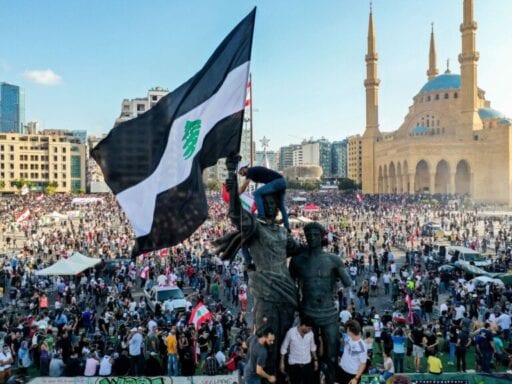Protesters demanded change following a massive explosion that exacerbated an existing economic crisis.
Thousands of demonstrators faced tear gas and rubber bullets in clashes with police in Beirut, Lebanon on Saturday in protests sparked by a massive explosion in the Lebanese capital last week that killed more than 150, injured around 6,000, and left about 300,000 people without homes.
Experts say the blast, one of the largest non-nuclear explosions in recent history, and one whose causes are still unclear, has dramatically intensified political and economic crises that preceded the explosion, while further corroding public trust in Lebanon’s government.
Thousands of protestors took to the streets in the city center, some gathering peacefully, and some throwing stones. Demonstrators chanted slogans including, “The people want the fall of the regime” — a popular chant during the Arab Spring in 2011 — and “Revolution, Revolution.” Protesters also held posters addressed to the country’s leaders that bore messages like, “Leave, you are all killers,” and signs commemorating the lives of people killed by the explosion.
A group of protestors broke into the foreign ministry and burned a portrait of Lebanese President Michel Aoun. Others forced their way into the Association of Lebanese Banks. When demonstrators tried to remove a barrier in order to enter the parliament building, police fired tear gas at them. Police also fired live ammunition into the air in an attempt to get crowds to disperse.
The origins of the explosion that have spurred the protests are not yet known. On Tuesday, two explosions in Beirut’s port area sent a red mushroom cloud thousands of feet into the air above the city. Lebanese officials say that over 2,700 tons of ammonium nitrate, which is used to make both bombs and fertilizer, had been stored there for six years without safety measures.
Lebanon’s president said on Friday that the government was investigating whether the explosion was triggered by a bomb, negligence, an accident or something else.
But protestors and much of the Lebanese public are skeptical of the government’s commitment to a serious investigation and see the event as yet another sign of deep-rooted corruption and incompetence in Lebanon’s political class.
“The chickens are coming home to roost,” Nizar Ghanem, the Beirut-based director of research at the think tank Triangle Policy Research Center told Vox. He pointed to a three-pronged economic disaster made up of a banking crisis, a currency crisis, and a sovereign debt crisis that helped inspire a protest movement in Lebanon last October as having stoked widespread distrust of the government — and as intensifying the anger fueling the today’s protests.
Rachel Raedi, a 20-year-old in Beirut, told the Guardian,“We were here in October, and so was our friend, she was campaigning for change to make Lebanon a better place. And now she is dead.”
Lebanon was in trouble before the explosion hit
As Vox’s Alex Ward has explained, Lebanon’s economy has been in abysmal shape for a long time, and the country’s faith in the government to operate in the public interest has been waning for many years:
The nation’s leaders mismanaged the economy for decades, namely with a Ponzi-like scheme whisking away the hard-earned money of Lebanese people from banks to keep the government afloat, pay off public debts, and line the pockets of those in charge. The troubled policy screeched to a halt after the country’s banks simply ran out of money last year — meaning Lebanese workers lost savings they’d stored in accounts and expected to be available when needed.
That worsened an already bad situation: the unemployment rate hovers around 25 percent and about a third of the country lives below the poverty line.
The lack of funds has pushed millions into poverty, forcing some to eat at best every other day. That’s made worse as the lira, Lebanon’s currency, has collapsed, driving the prices of necessary items like food upward. It’s why many experts fear Lebanon may soon see refugees flock out of the country, though they have few places to go in the war-torn region.
The explosion in Beirut has galvanized activists and disenchanted citizens while generating a new set of pressures on the government to meet the country’s many pressing needs.
“We are staying here,” a protester with a megaphone said, Reuters reported. “We call on the Lebanese people to occupy all the ministries.”
The most urgent needs are humanitarian ones. The blast took out Lebanon’s only large grain silo, for example, and United Nations agencies are helping provide medical aid and food to the country. An unknown number of people remain missing, and 300,000 people are living without basic accommodation and are in desperate need of shelter. And as Bujar Hoxha, the director of the aid group CARE’s Lebanon operation told Ward, resources are needed to help address the effects the explosion has had on people’s mental health.
“These people were already facing immense trauma, but this adds more fuel to what they were feeling,” Hoxha said. “I don’t know how much more they can take.”
But protesters do not just want their immediate needs fulfilled. Ultimately, their demands go far deeper — they are calling for structural changes and massive resignations across the political class. Tens of thousands of people have indicated through petitions that they don’t even trust the government to handle the influx of international aid to help with the aftermath of the explosion, with some signing a petition for France to retake control of the country.
Prime Minister Hassan Diab, who was appointed in December 2019, said he understood demonstrators frustrations on Saturday, but stressed the economic situation was not his fault, according to Reuters. And despite the mistrust the public has for politicians, he proposed elections as the solution to the crises Lebanon has faced: “We cannot get out of this crisis without early parliamentary elections,” he said.
Author: Zeeshan Aleem
Read More



